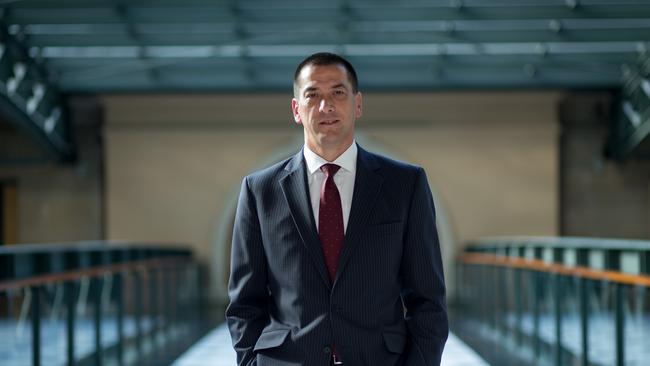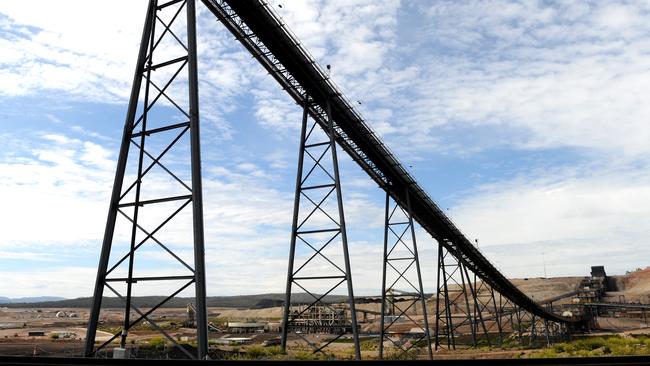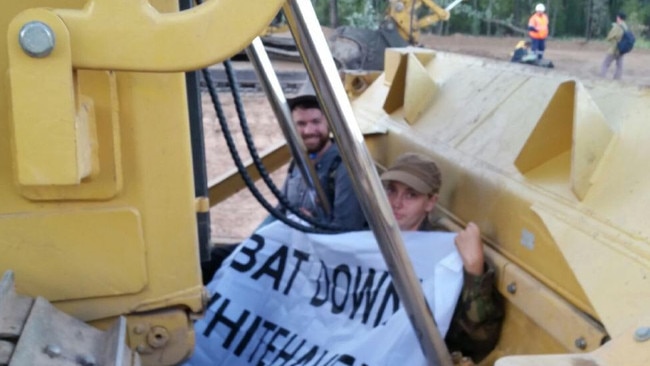Coal industry faces insurance, lending crunch after climate moves
Miner Whitehaven is struggling to secure debt and insurance cover as the finance industry curbs its exposure to coal.

Australian coal producers may be forced to self-insure as major providers shun the industry over escalating climate concerns, while the exit of several big four banks will cause international financiers to quit lending to the sector, Whitehaven Coal said.
Whitehaven, which operates four mines in NSW’s Gunnedah Basin, told a parliamentary inquiry of difficulties securing debt and insurance cover as the finance industry clamps down on its exposure to coal and its high-carbon emissions.
Major Korean insurers decided this week to stop insuring coal projects after UN Secretary-General António Guterres urged countries to end their “deadly addiction to coal”.
Whitehaven said momentum may prove hard to stop.
“I would suggest that while it has taken some time for the environmental, social and governance considerations in insurance to gain momentum, it looks like they may outshoot the banks in terms of their response,” Whitehaven chief executive Paul Flynn told an inquiry into the prudential regulation of Australia’s export industries.
“And that is making insurance very difficult to the point that the industry is now exploring self-insurance opportunities given that we understand that trend.”
Miner New Hope Group said nine out of ten insurers refuse to offer it coverage because it produces coal with one provider even avoiding insuring its car fleet due to links with the fossil fuel.
Whitehaven Coal told the parliamentary inquiry that the insurance industry was highly reluctant to back any coal miners and said costs had shot up 50 per cent as a result.
“In the insurance space nine out of 10 companies who we went to last year refused to insure us. We had one instance where one insurance company refused to insure our light vehicle fleet purely because we were a coal mining company,” New Hope chief executive Reinhold Schmidt told an inquiry into the prudential regulation of Australia’s export industries. Mr Schmidt said his business had been forced to consider self insurance.
A move by Australia’s big four banks to cut their exposure to fossil fuels would have major repercussions for international lenders who look to commitments made by local financiers when weighing up their own exposure.
“Our Australian situation is particularly unique in the sense that all of the pure play coal companies rely heavily on the domestic banks and while we do have an international funding syndicate, those international representatives in our syndicate won’t participate where there is a lack of local banks.
“The national banks are very, very influential and our direct feedback from the international banks is they would struggle to participate where the Aussie banks are not participating.”
All of Australia’s big four banks were in Whitehaven’s banking syndicate in 2014 when it delivered its Maules Creek coal mine, according to Mr Flynn. However, both Commonwealth Bank and ANZ were no longer lenders.
“At the time Maules Creek was bought online back in 2014 we had all Australian banks members of our banking syndicate. It’s a matter of public record that we no longer have in our lending facility CBA and ANZ. So there is definitely a contraction over time,” Mr Flynn said.
“In the case of CBA it was a retreat from the facility altogether and in the case of ANZ it’s been a decline over time and more recently their removal from the corporate facility that Whitehaven has enjoyed strong international support for.”

ANZ chief executive Shayne Elliott said in December he was proud the bank had not lent “a dollar” to any coal miners since his appointment in 2016, while the nation’s bank regulator has warned of the unprecedented impact of climate change on all parts of the financial system, putting lenders and insurers on notice they need to be on top of the risks to their businesses.
The role of coal in the long-term energy mix was also called into question by the International Energy Agency on Tuesday after it declared no new coal mines, oilfields or gas fields should be opened up if the world is to reach net-zero emissions by 2050.
Both coal and oil and gas producers are increasingly facing questions from investors about the risk of stranded assets, lowering the value of current operating mines and raising the prospect of some fossil fuel reserves potentially being worthless as the world targets a rapid move to renewable energy.
However, the Whitehaven chief rejected the stranded assets tag for coal and said moves by banks were out of step with current demand for the fossil fuel.
The restriction of funding for the coal industry is not a credit risk issue for the banks because these are profitable relationships,” Mr Flynn said.
“The notion of stranded asset risk is a fallacy – it does not exist in Australia, where the average term of a corporate debt facility is only 4-5 years. The inconsistency we are observing in the application of various carbon policies across our banks, is creating major uncertainty for our industry.”

Thermal coal prices are trading at their highest levels since 2008 and IEA data shows there is little sign the world’s coal consumption is set to decline substantially in the coming years, with rising demand in some Asian economies offsetting big falls in Europe and the US.
Whitehaven argued banks’ current policies surrounding coal are not “tethered to any domestic emissions reduction framework” and go significantly beyond the current energy transition settings from the Australian government.
It called for closer talks between the industry and financiers with the federal government’s bank deposit guarantee linked to their support for sectors including coal.
“The taxpayer-funded federal government’s bank deposit guarantee, in our submission, could be linked to the banks’ willingness to support the Australian economy, in particular our export industries,” Mr Flynn said.
“Similarly, a ‘regional Australia impact test’ or ‘national interest test’ could be introduced to ensure banks’ policy decisions are appropriately weighed against their potential social and economic impacts before significant measures are imposed.”
New Hope launched a $200m convertible bond on Thursday and said it relied on international banks from Europe, Asia and the US with no support from Australian institutions.
“Last night on our convertible bond, all the money was raised overseas. We had one Australian bank - but its not a traditional bank - assisted us with the process. And the large guys such as ANZ and CBA just do not want to participate as most people have probably told you today,” Mr Schmidt said.

